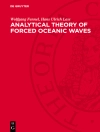This book deals with every aspect of oceanography in detail including various aspects of physical, chemical, geological, and biological discourse. ‘Earth and Planetary Science’ is perhaps the oldest, dynamic, and ever-evolving subject. Oceanography is one of its domains, which has become important in the present date, given the ubiquitous and undeniable climate change that we are experiencing. The subject domain of oceanography encompasses several environmental issues, which need serious attention from the present scientific community. Despite the ocean’s significant role in the collective well-being of the human race, a multitude of anthropogenic activities has drastically polluted and degraded several crucial oceanic ecosystems within a short span. This book aims to present a concise yet succinct introduction to Oceanography as a subject and at the same time highlight the cutting-edge topics of research encompassing marine pollution, coastal processes, and many other associated phenomena. Oceanography is an interdisciplinary emerging subject and students all over the world who come from varied disciplines are pursuing it as higher studies. Long sections are devoted to ocean–atmosphere interaction, tides, waves, and related coastal processes. The book represents a comprehensive idea of human activities bestowing the ocean with particular reference to Indian examples. This book helps to understand marine pollution and the behavior of oil, plastic, and other agents in the light of real-world examples and empirical models. Harnessing electricity from waves and tides is a technological advancement in the field of unconventional energy. The vast resources of the ocean like oil, mineral, methane hydrate, and their proper estimation and exploitation is the topic of discussion in the third part of the book. This book is designated to meet the essential needs of the students studying oceanography and marine science. It may be helpful to professional oceanographers also.
Spis treści
An introduction to Oceanography.- Marine Ecosystems.- Oceans and Human Activities.- Basic Oceanographic Parameters and their Significance.- Coastal Pollution – An Overview.- Nutrient Pollution.- Organic pollution.- Persistent Organic Pollutants.- Heavy metals.- Marine Oil Pollution.- Plastic Pollution.- Ocean Acidification.- Energy from the Ocean.- Marine Mineral Resources.- Coastal Hazards: Climatic and Hydrogeological Hazards.- Coastal Hazards: Geomorphic and Tectonic Hazards.- Global Sea-Level Rise and Associated Problems.
O autorze
Dr. Swapna Mukherjee is a retired director of Geological Survey of India and completed Ph.D. from Saha Institute of Nuclear Physics. He has authored three books with capital publishers, two of which were co-published by Springer. The second book covered the basics and industrial aspects of clays, and the third discussed applied clay science.
Dr. Kaushik Kiran Ghosh is an associate professor of the Department of Geology, Jogamaya Devi College, Kolkata. His research interest includes geochemistry and ore geology. Presently, he is working on the banded iron formation (BIF) and related iron ore deposits of India.
Dr. Abhra Chand is an assistant professor at the School of Oceanographic Studies, Jadavpur University. He has actively carried out interdisciplinary research in the field of greenhouse gas dynamics, and coastal and marine pollution in his brief eleven years of research career. He has 75 publications to his credit, including national and international journal articles and edited book chapters.












